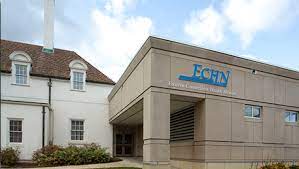By C-HIT Staff
Recommend Tweet Email Print More
Twenty-six Connecticut hospitals will lose some of their Medicare reimbursement payments over the next year as penalties for having too many readmitted patients, new data from the Centers for Medicare and Medicaid Services (CMS) show.
Nationally, Medicare is reducing payments to 2,499 hospitals, about 47% of all facilities, with the average penalty being 0.64%, according to a report by Kaiser Health News (KHN).
Rockville General Hospital Photo.
Rockville General Hospital received the largest penalty from CMS for readmissions.
This year’s penalties were based on tracking patients from July 1, 2017 through Dec. 1, 2019, so the influx of patient care during the pandemic is not included, CMS said.
In Connecticut, 72 % of all hospitals in the program will face a loss in CMS payments, beginning October 2021 through September 2022.
No Connecticut hospital received the maximum penalty of 3%. But Rockville General Hospital will lose 2.3%, the highest penalty of any Connecticut facility; and Bridgeport Hospital will lose 2.15%.
Five hospitals will lose more than 1% of their funds, 19 others less than 1%.
“Connecticut’s hospitals share a strong commitment to the quality of care they provide and to patient safety. Through the Connecticut Hospital Association, hospitals drive quality improvement through a shared commitment to best practice and clinical collaboration and we are always striving to do better,” said the CHA in a statement.
“Hospitals have been operating under tremendous strain in response to the COVID-19 pandemic while continuing to focus on quality improvement. We are encouraged that many hospitals showed improvement and we will maintain our focus on the quality of care delivered at hospitals across the state,” CHA said.

“This measure, and the results among Connecticut hospitals, demonstrate the need for a higher degree of coordinated care after hospitalization. This is a time when a discharged patient is particularly vulnerable to complications related to their recent hospitalization and when thorough, accurate, and understandable care instructions, new supplies, clarity and access to all medications and oversight of care are particularly important to their continued recovery.”
— Lisa Freeman, executive director
Connecticut Center for Patient Safety
Freeman said that while readmission measures have “the potential to slightly mislead patients because the readmission that is being counted can be for any reason, not only the reason for the initial hospitalization, it still addresses the wellness, or un-wellness of the patient at discharge.”
CHA has launched Unite Connecticut to improve hospital readmission rates. Under the program, “hospitals now have direct referral and communication loops, through a shared digital platform, to refer and support patients in need of community-based social services to help stabilize their living conditions and optimize their health. “
This year, the program has served more than 3,600 patients through referrals to about 280 community-based organizations. “We expect these robust support channels will help patients to realize better health outcomes, by addressing the social drivers of health. Over time, taking down those social barriers supports a patient’s ability to fully follow a course of treatment or make a necessary lifestyle change, reducing the need for readmission and also improving the patient’s health outcomes,” the CHA said. There are 11 hospitals participating and CHA said five more are in the process of joining.
The hospitals receiving penalties of over 1% are: Manchester Memorial, 1.8%; Middlesex, 1.67%; William Backus, 1.56%; Bristol, 1.34%; and Waterbury, 1.13%.
The 19 hospitals losing less than 1% reimbursement are: Charlotte Hungerford, .38%; Danbury, .31%; Day Kimball, .27%; Greenwich, .53%; Griffin, .02%; Hartford, 0.57%; John Dempsey, .78%; Johnson Memorial, .67%; and Lawrence + Memorial, .08%;
Also, Mid-State Medical, 0.45%; Norwalk, 0.74%; St. Mary’s 0.62%; Sharon, 0.02%; St. Francis, 0.56%; St. Vincent’s, 0.41%; Stamford, 0.22%; Hospital of Central Connecticut, 0.64%; Windham Memorial, 0.08%; and Yale New Haven, 0.76%.
Only two facilities received no penalty: Masonicare Health Center in Wallingford and Hebrew Home and Hospital Inc. in West Hartford.
Eight Connecticut hospitals are exempt from the program. They are: Connecticut Children’s Medical Center in Hartford, Connecticut Valley Hospital in Middletown, Natchaug Hospital in Mansfield, Connecticut Mental Health Center in New Haven, Southwest Connecticut Mental Health in Bridgeport, Silver Hill Hospital Inc. in New Canaan, the Connecticut Hospice Inc. in Branford, and Albert J. Solnit Children’s Center in Middletown.
This is the 10th year for CMS penalties, enacted under the Affordable Care Act (ACA).
To review Kaiser Health News’ data on hospital penalties over several years go here.
Support Our Work
The Conn. Health I-Team is dedicated to producing original, responsible, in-depth journalism on key issues of health and safety that affect our readers, and helping them make informed health care choices. As a nonprofit, we rely on donations to help fund our work. Donate Now


